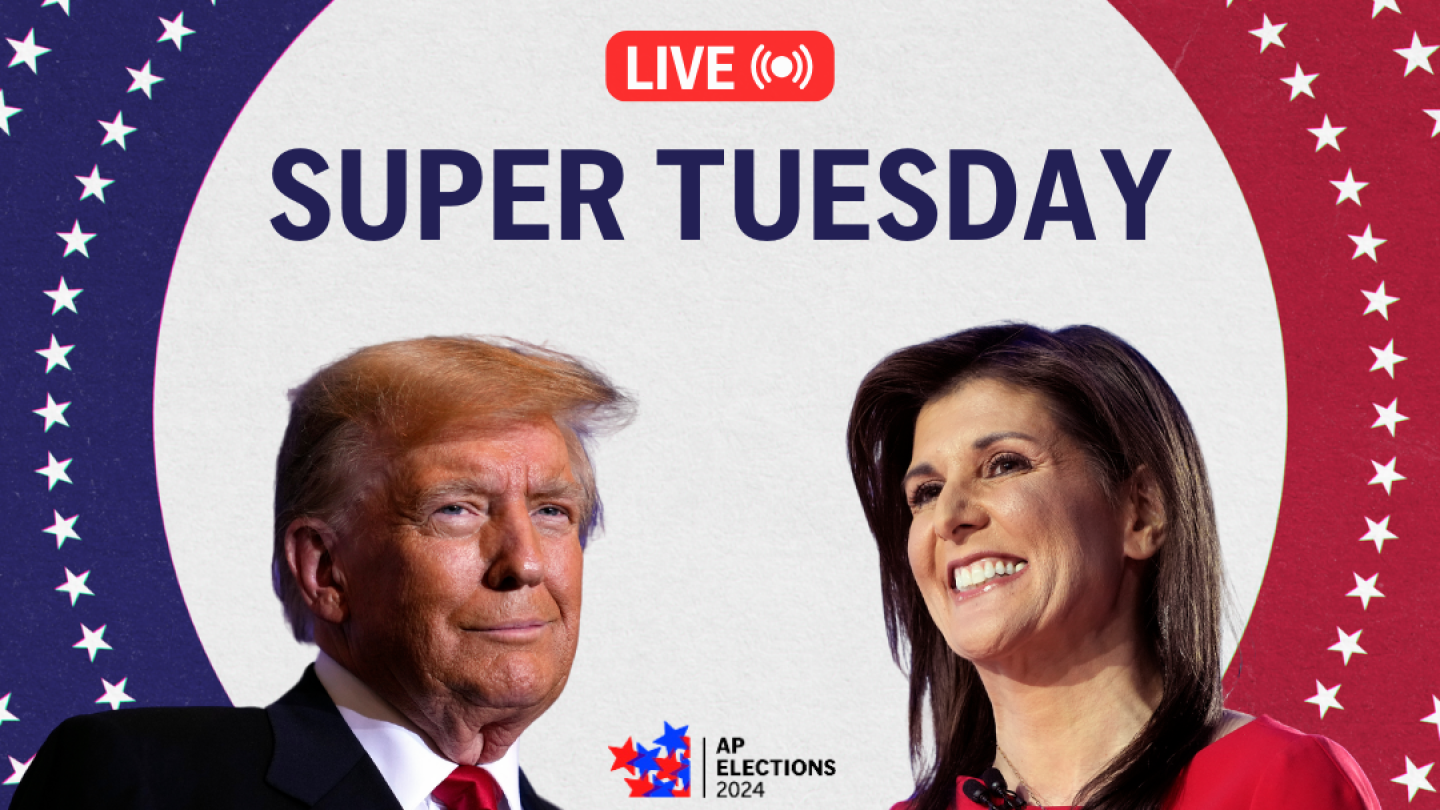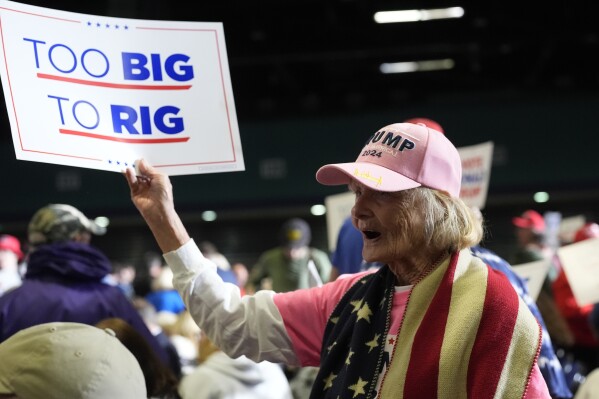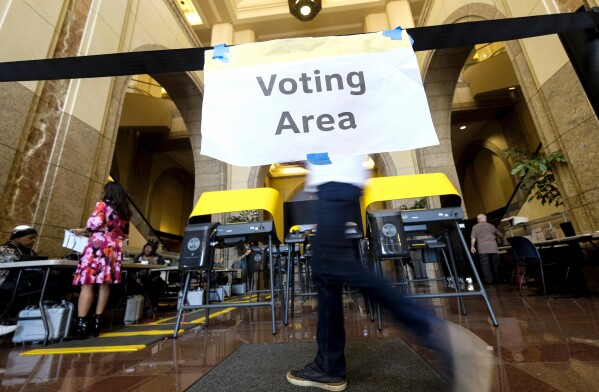Super Tuesday is March 5th, and voters from several states across the U.S. will be voting in primary elections. (Feb. 28)
Published [hour]:[minute] [AMPM] [timezone], [monthFull] [day], [year]
Updated [hour]:[minute] [AMPM] [timezone], [monthFull] [day], [year]
President Joe Biden and his predecessor, Republican Donald Trump, are looking to all but clinch their party’s nominations as both are heavily favored in each of the 16 states and one territory holding Super Tuesday primaries on March 5.
Here’s what we’re following:
- North Dakota: Trump notched another win in the state’s GOP presidential caucuses.
- Nikki Haley’s first 2024 win: The former U.N. ambassador won the Republican primary in the District of Columbia on Sunday, temporarily halting Donald Trump’s sweep of GOP voting contests.
- Donald Trump’s ballot eligibility: The Supreme Court unanimously restored Trump to 2024 presidential primary ballots, rejecting state attempts to hold him accountable for the Capitol riot.
WATCH: Haley says the Republican Party is ‘becoming Donald Trump’s playpen’
In Grand Rapids, Michigan on Monday, Republican presidential candidate Nikki Haley expressed concerns about the Republican Party in light of Republican National Committee Chair Ronna McDaniel saying she will leave her post on March 8. (Feb. 26)
AP VoteCast: Many Republican voters don’t think Trump committed a crime
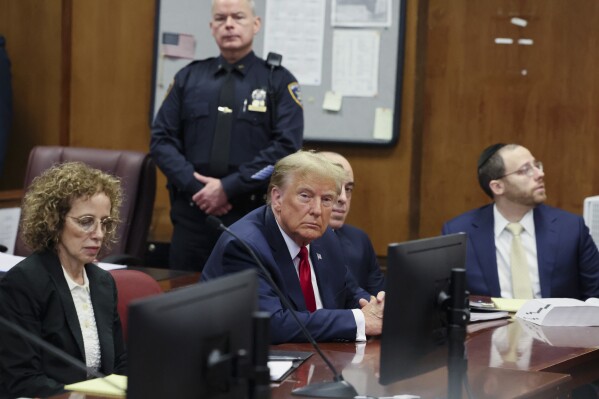
Former President Donald Trump appears during a court hearing at Manhattan criminal court, Thursday, Feb. 15, 2024, in New York. (Brendan McDermid/Pool Photo via AP)
Criminal trials are looming over Trump’s 2024 campaign, but according to AP VoteCast surveys in Iowa, New Hampshire and South Carolina, Republican primary voters mostly don’t believe he did something illegal.
Between 26% and 38% of voters in the early contests think that Trump has done something illegal in at least one of the three major cases against him: The case involving the classified documents found at his Florida home, the Washington, D.C. case involving his role in the riot at the U.S. Capitol on January 6, 2021, or the Georgia case involving Trump’s alleged attempt to interfere in the vote count in the 2020 presidential election.
The remaining voters think he either did something unethical but not illegal, or that he did nothing wrong.
AP-NORC Poll: Many Americans don’t feel the country or economy has improved under Biden | Live updates
As Biden makes the case that he deserves a second term as president, he’s facing a problem: Many people don’t think things have has improved since he’s been in the White House.
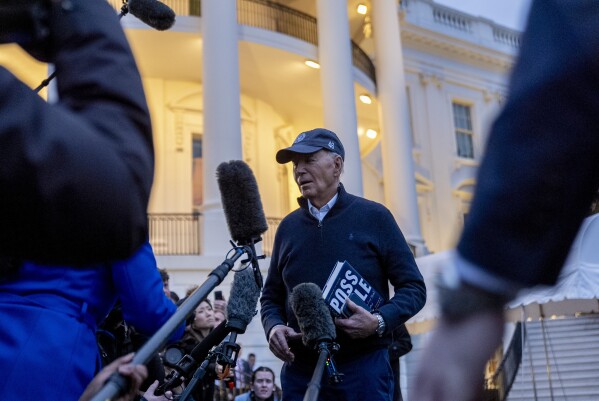
President Joe Biden speaks to members of the media before boarding Marine One on the South Lawn of the White House in Washington, Friday, March 1, 2024. (AP Photo/Andrew Harnik)
A new AP-NORC poll shows that few Americans see improvements in their own lives or the country as a whole over the past three years. More than half of U.S. adults say the national economy (57%) is somewhat or much worse off than before Biden took office in 2021, and a similar share (55%) say the country is somewhat or much worse off.
Americans are slightly less pessimistic about their own situations, but 41% say that they and their families are somewhat or much worse off than before Biden became president.
California Senate race: Democrats aim to block Republican from contest to fill Feinstein’s seat
LOS ANGELES (AP) — Several prominent House Democrats are jostling to fend off Republican former baseball great Steve Garvey in the yearlong battle to fill the U.S. Senate seat once held by the late Sen. Dianne Feinstein, with two slots on California’s November ballot at stake.
In a state where a Republican hasn’t won a Senate race since 1988, Democrats are expected to easily hold the seat in November, a relief for the party as it seeks to defend a fragile Senate majority. But first-time candidate Garvey, a National League MVP and former star for the Los Angeles Dodgers and San Diego Padres, reordered the contest that also features Democratic Reps. Barbara Lee, Katie Porter and Adam Schiff.
California puts all candidates, regardless of party, on one primary ballot, and the two who get the most votes advance to the general election. For months, Schiff has had the fundraising and polling edge, but it’s possible Garvey could claim the second spot on the November ballot, ending the congressional careers of Porter and Lee, two prominent progressives.
▶ This is an excerpt from a full story. Continue reading here.
AP VoteCast: Many early GOP primary and caucus voters believe Trump’s false claims about the 2020 election
Trump continues to falsely claim that the 2020 election was stolen from him because of overwhelming voter fraud. It’s a lie that has caught on with his supporters.
AP VoteCast surveys of early primary and caucus voters found that about one-third of voters in the Republican contests in South Carolina and Iowa correctly said that Joe Biden was legitimately elected during the 2020 presidential election. About 6 in 10 said, incorrectly, that he was not legitimately elected.
In New Hampshire, where the electorate is less conservative, about half of voters who participated in the GOP primary agreed with the untrue statement that Biden was not legitimately elected.
Key races to watch: Two California Senate primaries
The highest profile state race in California is the one to succeed the late Democratic Sen. Dianne Feinstein.
There’s a crowded field of candidates that include Democratic Reps. Barbara Lee, Katie Porter and Adam Schiff and Republican Steve Garvey, a former baseball star.
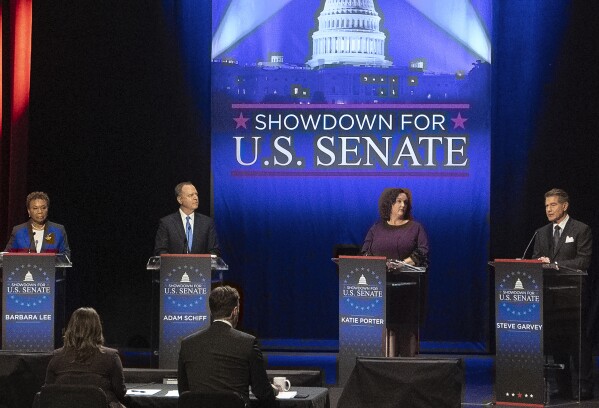
FILE -Candidates, from left, U.S. Rep. Barbara Lee, D-Calif., U.S. Rep. Adam Schiff, D-Calif., U.S. Rep. Katie Porter, D-Calif., and former baseball player Steve Garvey, stand on stage during a televised debate for candidates in the senate race to succeed the late California Sen. Dianne Feinstein, on Monday, Jan. 22, 2024, in Los Angeles. (AP Photo/Damian Dovarganes, File)
But, confusingly, there are two primary elections on the ballot to replace Feinstein. One is to fill the remaining months of her current term and the other is for a full six-year term starting in January 2025.
Keep in mind that California has a “top-two” primary system in which all candidates appear on the same ballot regardless of party, and the top two finishers advance to the general election.
▶ Read more about what to expect in the California primary races.
WATCH: How many delegates will it take for candidates to get the nomination?
With the Super Tuesday elections on March 5, a slew of delegates is up for grabs for the candidates competing for the Republican and Democratic presidential nominations. (March 1)
AP VoteCast: MAGA supporters are still making their mark

Supporters listen as Republican presidential candidate former President Donald Trump speaks at a campaign rally Saturday, March 2, 2024, in Greensboro, N.C. (AP Photo/Chris Carlson)
Trump’s “Make America Great Again Movement” is still a major force in the Republican Party.
According to AP VoteCast surveys of voters in the early Republican contests in Iowa, New Hampshire and South Carolina, 6 in 10voters in both the South Carolina Republican primary and GOP Iowa caucuses consider themselves supporters of MAGA. Half of those in New Hampshire also identified with the movement.
There is significant — but not total — overlap between Trump voters and MAGA supporters: In South Carolina, 82% of voters who said they cast a ballot for Trump also identify with the MAGA movement, compared to 21% of those who said they voted for Haley.
Trump and Biden are likely to sweep Super Tuesday, but they’re still not the ‘presumptive nominees’
Spoiler alert! Don’t read on if you want to be surprised by who will likely win today’s primaries.
Biden is the incumbent and faces only token opposition in the Democratic race. On the Republican side, Donald Trump has won nearly every primary so far, and is expected to win big on Tuesday, too.
Of course, there’s always the possibility for an upset. Nikki Haley is still in the race to be the Republican presidential nominee, but she’s facing tough contests in states where she’s struggled to win support. Biden is far and away leading over Democratic challengers.
But even though we think we know what will happen, neither Trump nor Biden will be able to claim the “presumptive nominee” title yet. The earliest that could happen is March 12 for Trump and March 19 for Biden.
While Joe Biden and Donald Trump have won every contest so far by large margins and are the overwhelming favorites to once again win their parties’ nominations, they’re not the “presumptive nominees” just yet. AP’s Meg Kinnard explains more.
WATCH: How Super Tuesday came to be
Voters across several states in the U.S. are preparing to cast their ballots on Super Tuesday, which takes place on Tuesday, March 5th. (Feb. 28)
Why is this Super Tuesday different?
Normally, it’s a big day that can make-or-break a candidate.
For example, in 2020, Joe Biden was basically counted out of the race after dismal showings in early primaries. But it was this swift and stunning comeback on Super Tuesday that really gave everyone a jolt. He ran the board, winning 10 of the 14 states. Other candidates dropped out out of the race after his wins. And you know what happened after that.
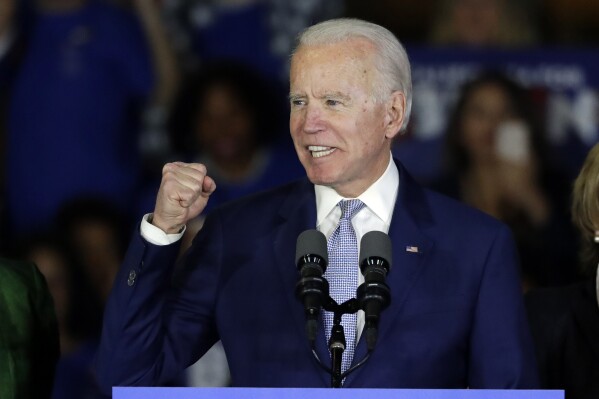
FILE – In this March 3, 2020, file photo, Democratic presidential candidate former Vice President Joe Biden speaks at a primary election night campaign rally in Los Angeles. (AP Photo/Chris Carlson, File)
But that was then. This year there’s not much of a chance for something weird and wild. For the Democrats, Biden is the incumbent and faces only token opposition.
On the Republican side, Donald Trump has won all but one Republican primary so far, and is expected to win big on Tuesday, too.
Trump talks about his wins so far
On the eve of Super Tuesday, the Republican frontrunner sat for a lengthy interview with Right Side Broadcasting Network, a Trump-supporting online broadcaster. Trump touted all his wins thus far in the GOP primary contest and said of his popularity in the party that there is something “really fantastic happening out there.”
“We’re happy to be a part of it,” Trump said. “The country wants help. They’re screaming for help.”
Trump largely repeated many of the points he makes at his campaign rallies, including false claims that the 2020 presidential election was “rigged.”
WATCH: Will Super Tuesday be Nikki Haley’s last stand?
Fresh off her first GOP primary win in Washington, DC, Nikki Haley heads into Super Tuesday hoping for new momentum. But with Donald Trump favored to win all upcoming contests, many are wondering whether Tuesday will be Haley’s last stand. (March 4)
What North Dakota voters are saying about GOP candidates
Retired music teacher and librarian Karen Groninger, 76, of Almont, said she voted for Donald Trump. She said it was partly because he spoke at the annual “March for Life” anti-abortion event in Washington, D.C. in 2020, the first time a sitting president has done so.
But longtime Republican state Sen. Dick Dever, of Bismarck, voted for Nikki Haley. He called President Joe Biden and Trump “polar opposites, and I think we need to move away from the extremes.”
“Government happens in the center,” he said.
Dever says “things have changed” since 2016 when he appeared behind Trump at an event in Bismarck.
Trump won the Republican presidential caucuses Monday.
AP RACE CALL: Donald Trump wins the Republican presidential caucuses in North Dakota
AP VoteCast: Haley’s base of support is limited
Nikki Haley has promised to stay in the GOP primary through Super Tuesday, but her performance in her home state of South Carolina illuminates why she’s struggling to win any state — much less the Republican nomination.
According to the AP VoteCast survey of GOP primary voters in South Carolina, Haley did well among people who have higher levels of education and moderates — neither of which is a very large or powerful group within the GOP electorate.
FILE – Republican presidential candidate former UN Ambassador Nikki Haley speaks at a campaign event in Spartanburg, S.C., Monday, Feb. 5, 2024. (AP Photo/Matt Kelley, File)
Even more limiting — about 2 in 10 of Haley’s supporters in South Carolina said they’re Democrats or lean toward the Democratic Party, and more than 4 in 10 voted for Biden in 2020.
Those are not typical GOP voters.
WATCH: More than 6 in 10 U.S. adults doubt Biden’s mental capability, poll shows
63% of U.S. adults say they lack confidence in Biden’s mental capability to serve effectively as president, according to a new survey by The Associated Press-NORC Center for Public Affairs Research.
AP-NORC Poll: 63% of Americans are not very or not at all confident in Biden’s mental capability; 57% say the same about Trump
Biden might not have any serious competition in the Democratic primary, but the 81-year-old president is still contending with widespread skepticism about his mental competence — even within his own base.
According to a new AP-NORC poll, only 40% of Democrats say they are extremely or very confident in Biden’s mental capability to serve as president. About 3 in 10 are somewhat confident and approximately one-third (32%) are not very confident or not at all confident.
Fortunately for Biden, Americans have similar concerns about his likely opponent. About 6 in 10 Americans (63%) say they are not very or not at all confident in Biden’s mental capability, and a similar share (57%) say the same about Trump.
But while they don’t have an especially high view of either man’s acuity, independents are much likelier to say they lack confidence in Biden (80%) compared to Trump (56%). And Republicans are less worried about their own likely nominee: 59% of Republicans are extremely or very confident in Trump’s mental capability to serve as president.
AP VoteCast: Immigration is a top issue for GOP primary and caucus voters
Immigration is quickly becoming a central issue in the 2024 election, even overshadowing other perennially important topics.
In the Iowa, New Hampshire and South Carolina Republican primaries and caucuses, AP VoteCast surveys found that immigration emerged as the top issue for voters, beating out the economy and foreign policy concerns.
Trump’s hardline policies and rhetoric on immigration are popular among early contest voters. Between 79% and 88% of voters in the Republican contests in Iowa, New Hampshire and South Carolina say they support building a wall along the U.S.-Mexico border.
Around 7 in 10 early state voters also said that immigrants in the U.S. today are doing more to hurt than help the country.
North Dakota governor stumps for Trump
Republican caucusgoers in Bismarck, North Dakota, lined up at a local college to cast their ballots before heading into a spacious event room for hors d’oeuvres.
State Gov. Doug Burgum spoke virtually on Trump’s behalf, saying that North Dakota will “send a message that is going to be a kickoff to tomorrow.”
“This race is going to be the end of the trail, and we’re going to say that we have a nominee, and let’s go after and beat Joe Biden,” Burgum said.
WATCH: This is how GOP voters feel about Trump and Haley
Donald Trump appears close to invincible in the Republican primaries and caucuses, but despite his commanding victories, the front-runner’s strength among general election voters remains unclear. AP’s Josh Boak explains more.
Haley says she no longer feels bound by the GOP pledge to support the eventual nominee
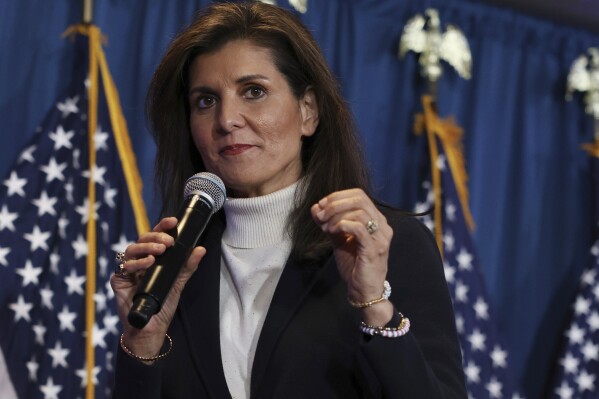
Republican presidential candidate and former United Nations Ambassador Nikki Haley speaks at a campaign event in Portland, Maine, Sunday, March 3, 2024. (AP Photo/Reba Saldanha)
Republican presidential candidate Nikki Haley said Sunday she no longer feels bound by a pledge that required all GOP contenders to support the party’s eventual nominee in order to participate in the primary debates.
The Republican National Committee had made the pledge a prerequisite for all candidates, and nearly every major contender signed, except for Donald Trump, the current front-runner, who skipped the debates.
When Haley, Trump’s lone remaining major challenger for the nomination, was asked on NBC’s “Meet the Press” whether she was compelled to honor that commitment, she said, “No. I think I’ll make what decision I want to make.”
▶ Read more about Haley’s comments on the RNC pledge.
New AP-NORC Poll: Republicans and Democrats are deeply divided on Ukraine aid
After months of fighting over foreign aid in Congress, Democrats are less likely than they were last fall to want to pull back military support for Ukraine.
About 4 in 10 Democrats (44%) say the U.S. is spending “too little” on aid to Ukraine in the war against Russia, up from 17% in November, according to a new AP-NORC poll. The share of Democrats who say the U.S. is spending “too much” (17% now, from 32% in November) or “about the right amount” (38% now, from48% in November) has dropped over the same period.
Republicans and Independents still tend to want to send less aid: 55% of Republicans and 45% of Independents think the U.S. is spending “too much” on assistance to Ukraine.
Local election officials face a long list of security challenges
On Super Tuesday, the federal government’s cybersecurity agency is going to provide some back up to state and local election officials who are facing a long list of security challenges including the threat of cyberattacks waged by hostile foreign governments.
The U.S. Cybersecurity and Infrastructure Security Agency — known as CISA — is standing up an election operations center to bring together federal, state and local election officials and the private sector. The idea is to share real-time threat information.
After the 2016 election, the nation’s voting systems were designated as critical infrastructure on par with the nation’s banks, nuclear power plants and dams. That means state election officials can now receive security clearances and federal resources such as cybersecurity and security reviews.
Trump is doubling down on incendiary rhetoric that fires up his base – but alienates other voters
Candidates who are about to win their party nominations generally massage their messaging and try to emphasize points that appeal to a broader audience. Not Donald Trump.
The former president has doubled down on the incendiary rhetoric that fires up his base but alienates wide swaths of voters. On Saturday, he suggested President Joe Biden was trying to “overthrow” the United States with his border policies.
He’s compared himself in recent weeks to Russian dissident Alexei Navalny, who died in an Arctic prison, and suggested Black people like him better because he faces prosecution in four separate cases.
His aides say they’re modifying their strategy and tactics for the general election and a likely Biden rematch but won’t try to change what Trump says.“Donald Trump is Donald Trump. That’s not going to change,” senior campaign adviser Chris LaCivita said. “Our job is not to remake Donald Trump.”
There’s one contest to go before Super Tuesday
Most of the attention is on tomorrow’s elections. But before we’re in full Super Tuesday mode, there’s still one more contest to go.
Republicans in North Dakota will gather around the state on Monday evening to participate in presidential caucuses. Four candidates are on the ballot, including Trump and Haley along with candidates that have received little attention, such as Florida businessman David Stuckenberg.
North Dakota Gov. Doug Burgum will speak on Trump’s behalf after ending his own presidential campaign in December.
While North Dakota isn’t often a major player in national politics, the state’s caucus chair is suggesting that a surprise there – such as a Haley win — could affect the Super Tuesday contests.
“If something unusual happens in North Dakota,” Robert Hams said, “it could very well influence how some of those other states vote the following day.”
Haley wants Trump on the ballot
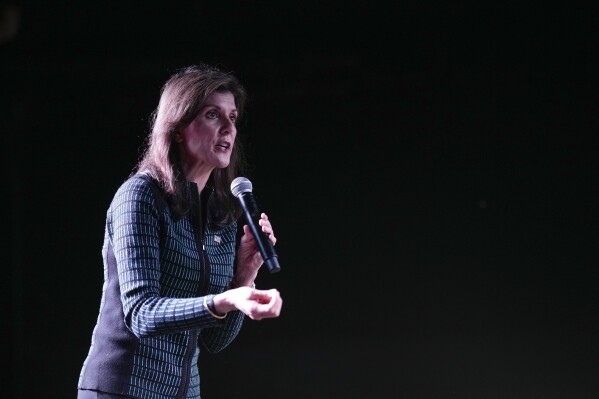
Republican presidential candidate former UN Ambassador Nikki Haley speaks at a campaign event in Spring, Texas, Monday, March 4, 2024. (AP Photo/David J. Phillip)
Nikki Haley made two points in suburban Houston on Monday that show how her campaign speech — and her place in the national political conversation — have changed.
In the wake of the Supreme Court decision Monday that allows Trump to remain on the ballot, she added to her well-rehearsed campaign speech, “I’ll defeat Donald Trump fair and square. But I want him on the ballot.”
Haley’s more wholesale blaming of Trump for recent Republican losses shows how far she’s ventured in the past two months. Her sharpest criticism of the former president used to be that “chaos follows him everywhere.”
But from a small-business warehouse in Spring, Texas, she rattled off Republican setbacks in swing states, the Republican National Committee and Congress that have taken place since Trump seized the party’s national mantle.
“Maybe Donald Trump is the problem,” she told her Texas audience.
It’s a long, long way from the former Trump appointee who said she wouldn’t run against him.
North Carolina voters are casting their ballots under new election rules
The head of North Carolina’s elections wants to remind voters about some law changes ahead of the Tuesday primary.
Karen Brinson Bell says absentee ballots must be in the hands of county election workers by the close of polls Tuesday night or they won’t count. In the past, ballots postmarked by the election date would count if received within three days.

Karen Brinson Bell, executive director of the State Board of Elections, poses for a picture while working at the State Fairgrounds in Raleigh, N.C., Monday, Dec. 6, 2021. (AP Photo/Bryan Anderson)
Bell has warned voters against putting ballots in the mail on Monday because they likely won’t likely arrive in time. Instead, they should return ballots in person to the county board offices or vote in person at one of the nearly 2,600 election-day sites statewide.
For many voters, this is also the first election where they will be required to show photo identification. That’s from a 2018 law that had been delayed by litigation. But voters who don’t have a qualifying ID can fill out an exception form.
Takeaways from Trump’s Supreme Court win: His legal peril is just starting
Former President Donald Trump gained a clear win at the U.S. Supreme Court on Monday, which unanimously ruled that states don’t have the ability to bar him — or any other federal candidates — from the ballot under a rarely-used constitutional provision that prohibits those who “engaged in insurrection” from holding office.
The decision shuts down a push in dozens of states to end Trump’s candidacy through a clause in the 14th Amendment, written to prevent former Confederates from serving in government after the Civil War.
But it may open the door to further electoral uncertainty, exposing more state officials to disqualification under the provision and setting up a constitutional showdown should Trump win the election.
Facing four separate criminal trials, Trump’s legal peril may just be beginning. So is the Supreme Court’s role in that process.
▶ Read the AP’s takeaways on today’s Supreme Court decision.
WATCH: Supreme Court restores Trump to ballot
The Supreme Court has restored Donald Trump to 2024 presidential primary ballots, rejecting attempts in Colorado, Illinois, and Maine to hold the former Republican president accountable for the Jan. 6 Capitol riot. (March 4)
What even is Super Tuesday?
It’s traditionally the biggest day nationwide for primary elections and caucuses before the actual Election Day in November.
Until now, only one or two states hold primaries on the same day. But this Tuesday, voters in 16 different states and one territory (Get it? “super” Tuesday) will be choosing who they want to run for president. Some states are also choosing who should run for governor or senator for their state, and some district attorneys, too.

